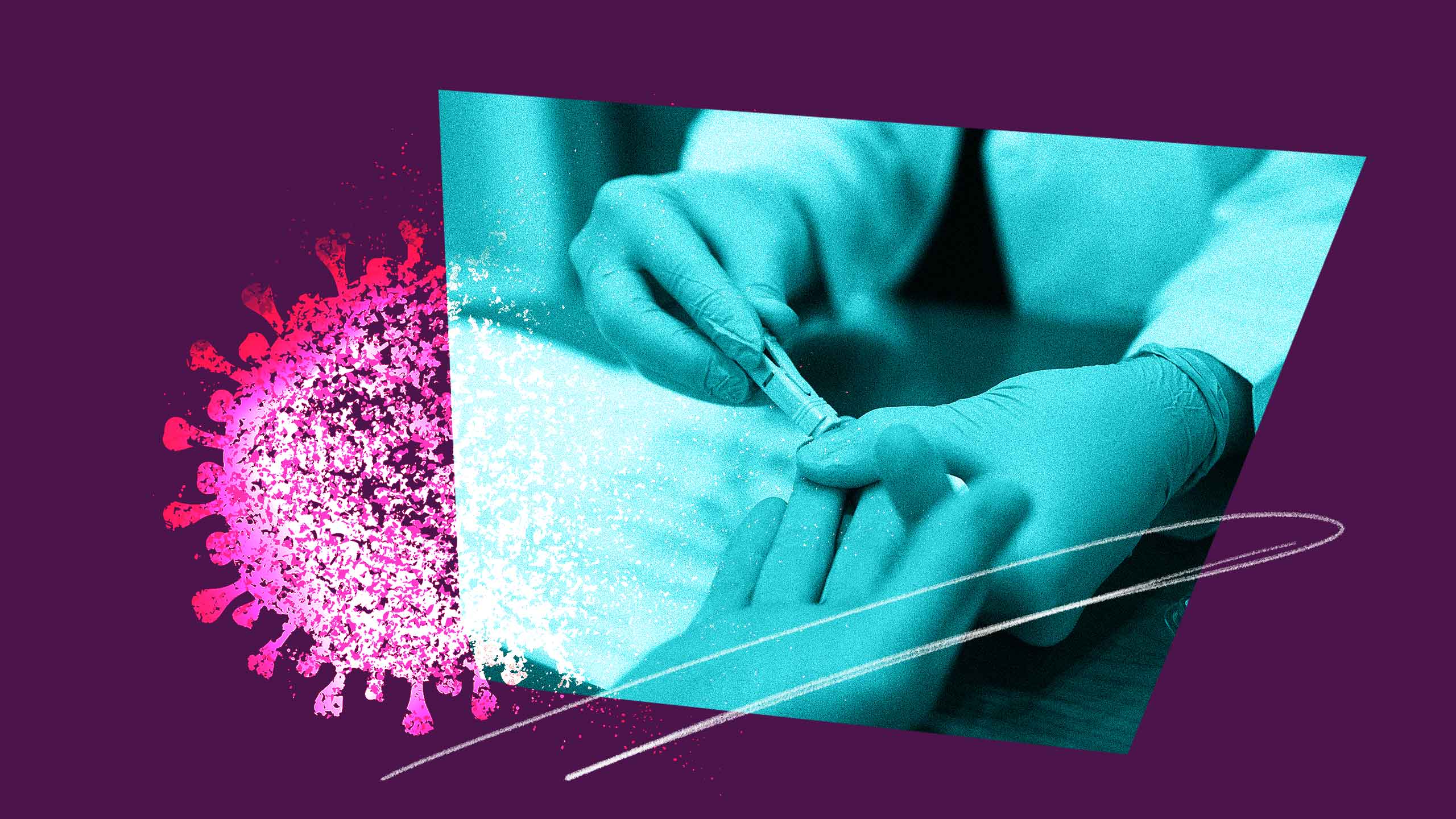Could treating and curing HIV play a role in preventing future COVID-19 variants?
Possibly, according to new research from a group of South African scientists. In a study released online this month, researchers suggest that the hyper-transmissible and vaccine evasive variants of COVID-19 such as Delta and Omicron could have their origins in an HIV-positive person, or a person with a similarly compromised immune system. The research suggests that someone who’s already immunocompromised—like an HIV-positive individual for example—can quickly become a breeding ground for new viral variants.
So does that mean curing HIV could play a role in stopping future COVID-19 variants? And how are LGBTQ2S+ communities affected?
Here’s what you need to know about the emerging research.
What is the link between HIV and COVID-19 variants?
The preprint—meaning it hasn’t been peer-reviewed yet—study conducted by a collective of South African researchers back in June traced a sample of the novel coronavirus back to an HIV-positive woman who was not receiving effective antiviral therapy.
According to their tests, she had the COVID-19 virus in her body for 216 days, during which she accumulated 32 mutations. Viruses like the novel coronavirus that causes COVID-19 naturally accumulate mutations over time, the vast majority of which are harmless. However, it just takes a key mutation in the right place at the right time to spawn more transmissible variants like Beta, Delta and Omicron.
In the preprint study, researchers showed that the woman developed a coronavirus variant with mutations similar to the Beta variant and “vaccine escape,” meaning it was more resistant to vaccines.
“This example is consistent with the notion that variants arising in immune-compromised hosts, including those with advanced HIV disease, may evolve immune escape of vaccines and enhanced escape of Delta immunity, with implications for vaccine breakthrough and reinfections,” the researchers wrote.
Basically: an immunocompromised person, such as someone who is HIV-positive, can’t fight off COVID-19 in the same way, and their body can make room for more of those mutations to develop, which can lead to dangerous variants that are more transmissible or that render current COVID-19 vaccines less effective.
The first sample of the Omicron variant of the novel coronavirus was taken on Nov. 9, according to the World Health Organization. Since then, researchers have worked to trace the origin of the highly contagious and vaccine evasive variant, and the large number of youth living with untreated HIV in South Africa could be a possible origin.
How does this connect to HIV treatment and cures?
Writing for the journal Nature this month, four of the researchers for the study pushed for a dual approach to tackling HIV and COVID-19 as means to prevent the emergence of new variants.
“A failure to tackle the pandemic with sufficient urgency in countries with high rates of uncontrolled advanced HIV could lead to the emergence of variants of the coronavirus SARS-CoV-2 that spread more easily between people or render the vaccines less effective,” they wrote. “Conversely, both diseases could be curbed more effectively if they are tackled simultaneously, with public-health responses strengthened by the lessons learnt from both.”
They specifically called for prioritizing COVID-19 vaccination in Africa, and more research into the links between HIV and COVID-19. But they also suggested that investing resources into controlling the HIV epidemic can help prevent the emergence of new coronavirus variants.
“In the longer term, stakeholders could also apply some of the innovations in the global COVID-19 response to HIV,” they wrote. “Extraordinary achievements, for instance, in the tracking of cases and deaths, in genomic surveillance and in data sharing have demonstrated the degree to which ‘knowing your epidemic’ in near-real time can help to guide a public-health response at local, national and global scales.”
Put simply, if we needed any more motivation to do everything possible to properly treat HIV, COVID-19 is it.
What does that mean for LGBTQ2S+ people living with HIV?
The preprint study focused on HIV in Africa largely due to HIV’s high prevalence on the continent: two out of every three people living with HIV worldwide live in Sub-Saharan Africa. HIV treatment in North America and Europe is vastly more accessible and widespread, proportionate to the percentage of the population living with HIV.
But that doesn’t mean other people living with HIV aren’t impacted by this work.
A sizable number of people living with HIV in North America are LGBTQ2S+. According to the Human Rights Commission, if current diagnosis rates continue, one in six gay and bisexual men in the U.S. will be diagnosed with HIV in their lifetime. And one international analysis found that transgender women in certain communities are 49 times more likely to live with HIV than the general population.
Any further investment into treating or curing HIV will help these populations—whether it’s in more research and money going towards understanding HIV, developing better treatments or vaccines. We’ve already seen this in action, with the revolutionary MRNA vaccine research that could lead to an HIV vaccine.
Put simply, a huge chunk of the LGBTQ2S+ population stands to benefit the more focus there is on treating and curing HIV and COVID-19.
Finally, it’s important to keep in mind that in their writing for Nature, the researchers warn of the inevitable stigmatization HIV-positive people will face the more HIV is linked to COVID-19. They specifically caution lawmakers against punishing HIV-positive people in an attempt to control COVID-19.
“Only global solidarity—not discrimination, blockage or the hoarding of resources—will end the COVID-19 pandemic,” they write.


 Why you can trust Xtra
Why you can trust Xtra


